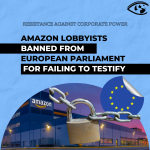EU: Brussels to raise fines for cartels tenfold
Companies found guilty of anti-competitive practices will face multibillion euro fines or more than 10 times the current tariffs for abusing their monopoly and taking part in cartels under draconian new competition guidelines adopted by the European Commission today.
Microsoft, the world's biggest software group was fined a record â¬497m (£333m) in March 2004 for abuse of dominance. But advisers to Neelie Kroes, EU competition commissioner, said it would have faced a fine of at least â¬2bn under the revised guidelines, with potential penalties up to 15 times higher.
Fines under the new guidelines, which take effect next month, will be raised to up to 30% of annual turnover in the sector of business that breaches competition law, and will be multiplied by the number of years the offence occurs.
The revised rules are designed to stiffen the deterrent effect and encourage whistleblowers, which would get more lenient treatment. They are seen as a warning to Microsoft to address the commission's concerns about its new operating system, Vista, and are also directed at repeat offenders in the chemicals and other sectors.
Sources said: "If Microsoft does not address these concerns, we may have to act under the new guidelines before the court of justice [ECJ] rules on its appeal over the earlier fine and our finding that it abused its dominance with regard to inter-operability and Windows MediaPlayer."
The ECJ is unlikely to rule until the end of this year at the earliest and Microsoft already faces the possibility of â¬2m a day fines, backdated to December 15 2005, for failing to comply with the order imposed by Mario Monti, the predecessor of Ms Kroes. These are due to be imposed on July 12. A spokesman for Microsoft stressed that the new penalties, which could be put in place over the next few months, would only apply if the Commission released a new statement of objections and cannot be applied to the current investigation. He added that Microsoft continues to work closely with the European authorities.
Ms Kroes, a Dutch Liberal and consumer champion, said: "The three main changes ... send three clear signals to companies: don't break the anti-trust rules; if you do, stop it as quickly as possible, and once you've stopped, don't do it again ... If companies do not pay attention to these signals they will pay a very high price."
The guidelines, first adopted in 1998 and allowing the EU to impose fines of up to 10% of global turnover, have been upheld by the ECJ on repeated occasions although the court has, in some instances, reduced these penalties on appeal. They can be applied retrospectively to cases now under investigation and will be tailored according to the economic gravity and duration of the offence.
Ms Kroes, who first signalled her intention to get tough on cartels and monopolies last year, will now levy a fierce "entry fee" on companies taking part in such anti-competitive behaviour. The new deterrent will be equal to 15%-25% of the annual relevant sales and come on top of the infringement fine.
Senior officials, who insisted that their calculations of the penalties that would have applied in past cases remain confidential, said the revised rules should encourage whistleblowers - who escape scot-free - to come forward. "The phone lines may be buzzing this afternoon," they said.
Repeat offenders, such as the chemicals groups Solvay, Bayer, Degussa and ICI, will also be fined 100% more - or twice the current level - if previously found guilty not only by the EU but by national regulators. Lawyers welcomed the new rules as providing more clarity and predictability for companies unclear about the likely size of penalties and for targeting larger firms.
- 192 Technology & Telecommunications
- 195 Chemicals



